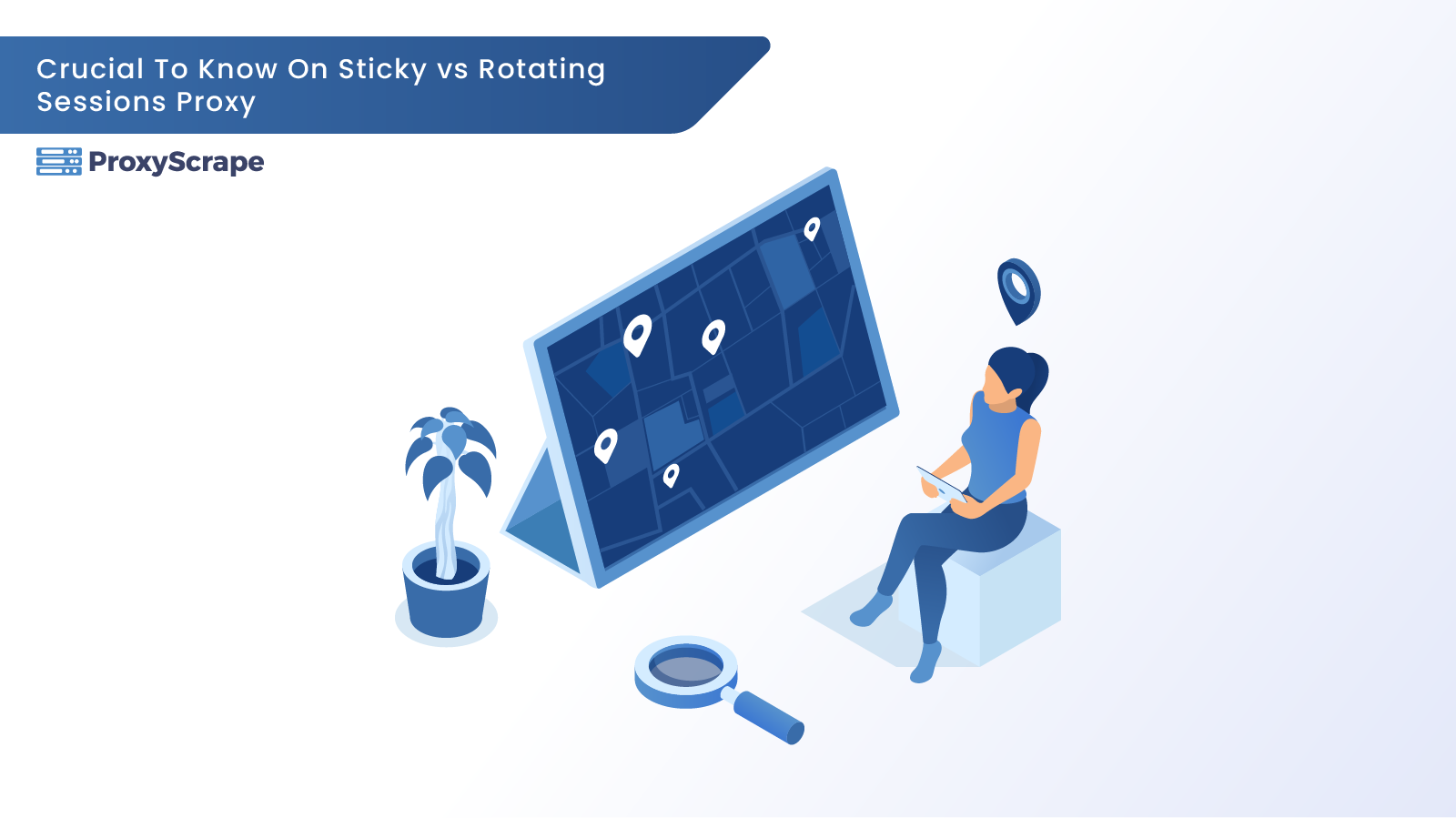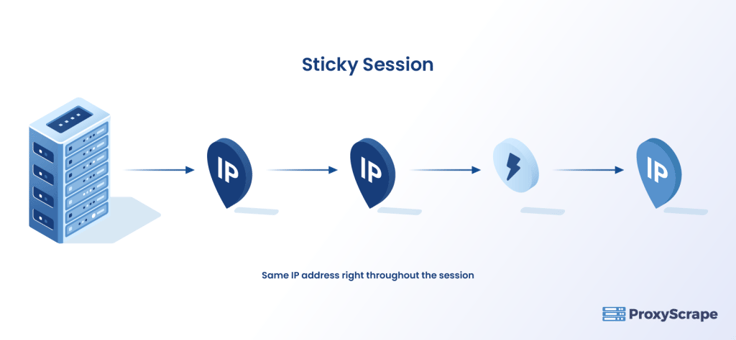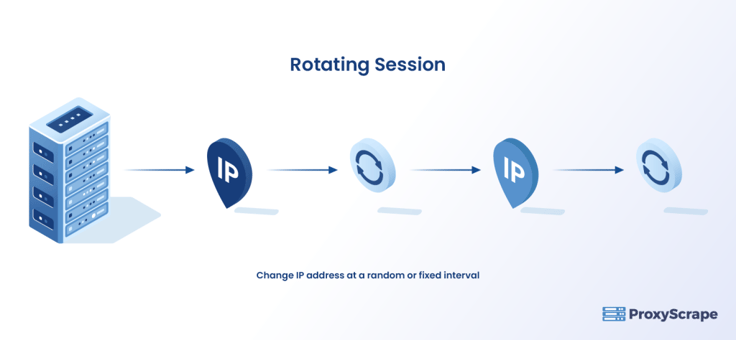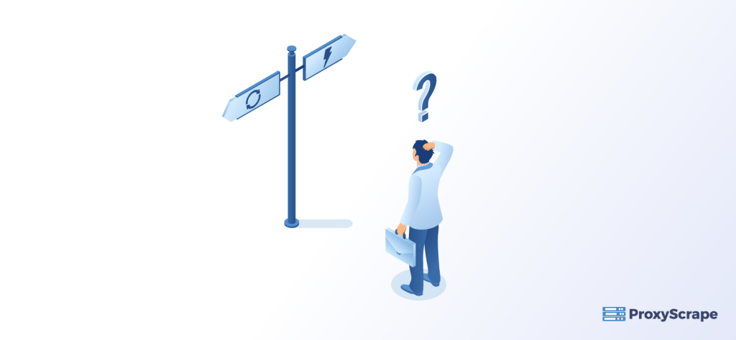Crucial To Know On Sticky vs Rotating Sessions Proxy In 2026

Sticky vs Rotating Sessions Proxy: Which Is Best? “Proxy server” is one of the most used terms in the cyber security sectors. But what is it actually? A proxy server is an intermediary server that sits between you (the client) and the target server (the server you are trying to access). Usually, without any proxy
Sticky vs Rotating Sessions Proxy: Which Is Best?
“Proxy server” is one of the most used terms in the cyber security sectors. But what is it actually? A proxy server is an intermediary server that sits between you (the client) and the target server (the server you are trying to access). Usually, without any proxy or VPN, the traffic will be direct traffic to the target server and vice-versa. This is known as two-way communication. This communication exposes your IP address and makes you vulnerable to cyber-attacks.
This is where the proxy server comes in and helps to fight against cyber attacks. The proxy server, as said, is an intermediary between you and the target server. All your online will be passed through the proxy server and reach the target server. This way of communication is called “three-way communication.” This helps you mask your original IP address and avoid unnecessary IP bans and cyber attacks.
Nowadays, accessing free proxies online is easy, but it is dangerous. Free proxies are used by many users on the network, meaning no security. Cyber attackers can easily access your IP address and other information and perform any attacks. It is best to purchase elite and reliable proxies from reliable proxy providers.
After purchasing a proxy, launching projects such as web scraping projects with proxies is not easy. One of the most critical decisions you need to consider is choosing a suitable session for your proxy, along with other factors such as learning what a bot is, configuring it, and avoiding blocks.
This article explains the sticky vs rotating session proxy in detail so that you can make an informed decision on your purchase.
Feel free to jump to any sections to learn more on sticky vs rotating sessions proxy in detail!
Table of Contents
- Sticky vs Rotating Sessions Proxy: Which Is Best?
- What Is a Sticky Session, And How Does It Operate?
- What Is a Rotating IP Session, And How Does It Operate? Proxy Rotator
- Proxy Rotator
- Sticky or Rotating session: Which Is Suited For Your Business? Use of Sticky Proxies for Web ScrapingUse of Rotating Proxies for Web Scraping
- Use of Sticky Proxies for Web Scraping
- Use of Rotating Proxies for Web Scraping
- Which Of The Two Proxies Is To Pick? Use Cases of Sticky ProxiesUse Cases for Rotating Proxies
- Use Cases of Sticky Proxies
- Use Cases for Rotating Proxies
- Best Sticky and Rotating Sessions Proxies Online: Suggested Reads:
- Suggested Reads:
- FAQs:
- Conclusion
What Is a Sticky Session, And How Does It Operate?
Well, in a sticky session, you will have the same IP address right throughout the session that you’re connected to the Internet. So each time you make a new request, your IP address will not change and will have the same proxy. The positive aspect of a sticky session is that you appear as a legitimate user since you have the same IP address for a longer duration.

Mostly sticky IPs are associated with datacenter proxies. While residential proxies are continuously rotating, there are exceptions to it. For example, with some proxy providers, their datacenter proxy may last for up to 30 minutes. Then their users could switch to static residential proxies for a certain period. Unfortunately, it’s impossible to guarantee that residential proxies’ IPs will remain the same for their entire duration.
So it’s essential to determine what sort of proxies you need for your situation.
What Is a Rotating IP Session, And How Does It Operate?
Unlike the sticky sessions, which assign one static IP for the entire session, the rotating proxies provide access to a whole pool of IP addresses. Therefore rotating proxies change at a random or fixed interval. Let’s consider the example below to provide you with an overview of how the rotation session works.

For instance, let’s assume you will be given an IP address when you visit a web page. Then afterward, you decide to visit another page, and since it is a new request, your IP address will change.
Some of the significant benefits of rotating proxies are that since the IP addresses originate from different Geo locations unrelated, it gives a greater level of anonymity and security when browsing the web.
Proxy Rotator
Rotating proxies are often confused with proxy rotators. Later is a software application that rotates a collection of static proxies. This software automatically assigns IP addresses to a device and lets you select a cooling time for each IP change. This tool is a valuable addition to datacenter proxies. You can access the software here. With this tool and the datacenter proxies, your online tasks will be smooth as butter without any interruptions.
Sticky or Rotating session: Which Is Suited For Your Business?
Those in the eCommerce industry know that their competitors would be scraping for product information from their websites. Although business owners scrape from their competitors’ websites to grow their business, heaps of traffic can harm the target web server and cause a negative customer experience. Since people use automated bots at a larger scale for scraping, it would slow down the target web server and ultimately lead to bringing down the websites.
To combat such harmful effects by bots, many website owners use antibot measures as a bot could go as far as shutting down a business. Website owners also employ anti-scraping mechanisms to detect suspicious behavior to distinguish genuine web scrapers from bots. Bots usually send a large amount of traffic from a single IP address. This is where you need to use your knowledge of rotating and static proxies.
Use of Sticky Proxies for Web Scraping
As you learned previously, the static proxies have an IP address that doesn’t change for a period till you do not want to change it. So the significant advantage of using static proxies is that it’s hard to detect them as a virtual machine can’t run them. However, to be cautious, you need to be aware that hundreds of requests can arrive from a single IP address in a short period. So the target website servers can recognize this activity as that of a bot and result in a block.
Use of Rotating Proxies for Web Scraping
When you scrape product information from a vast number of product pages, you are likely to encounter a block from target websites. Using rotating proxies can help you prevent your IP address from getting blocked. You will have to use a pool of rotating proxies with a proxy rotator to switch different IP addresses. As a result, you would bypass the anti-bot measures implemented by the target website administrator’s website.
Which Of The Two Proxies Is To Pick?

Ultimately your choice depends on your needs, as both types of proxies have their pros and cons. Let’s look at some of their use cases in real-world for instance:
Use Cases of Sticky Proxies
- Social Media Management: Sticky IPs perform best when managing several social media accounts, such as multiple Instagram accounts. They provide a unique and exclusive IP address for each account that appears as a separate account from an individual user. But in reality, it is managed by the same IP address as the primary account with the same automation tool.
- E-commerce: There can be promotions and deals from specific locations which would not be possible to access without proxies. When you connect using a sticky proxy and complete the transactions, it is impossible to spam because the IP is from the exact location.
- Market research – static proxies will be helpful for manual market research. This is when a marketing specialist wants to research the market data through a user’s eye from a specific location. IOP rotation may result in incorrect data as most of the marketing content is dynamic.
Use Cases for Rotating Proxies
- Web scraping- you may need to scrape many web pages when scraping for price data. This usually takes quite a long time, and using a single proxy will likely get you banned. Therefore, you can use rotating proxies to exceed the number of requests you can send for a target website and keep rotating until you extract all the data.
- SEO monitoring – In Search Engine Optimization (SEO), when you need to target traffic for various locations across the globe, you can use rotating proxies per location to determine how your site performs.
- Travel aggregators –The travel aggregator websites use rotating proxies to scrape prices from different websites using rotating proxies.
Best Sticky and Rotating Sessions Proxies Online:
ProxyScrape is one of the most popular and reliable proxy providers online. Three proxy services include dedicated datacentre proxy servers, residential proxy servers, and premium proxy servers. So, what is the best possible outcome for the best sticky vs rotating sessions proxy? Before answering that questions, it is best to see the features of each proxy server.
A dedicated datacenter proxy is best suited for high-speed online tasks, such as streaming large amounts of data (in terms of size) from various servers for analysis purposes. It is one of the main reasons organizations choose dedicated proxies for transmitting large amounts of data in a short amount of time.
A dedicated datacenter proxy has several features, such as unlimited bandwidth and concurrent connections, dedicated HTTP proxies for easy communication, and IP authentication for more security. With 99.9% uptime, you can rest assured that the dedicated datacenter will always work during any session. Last but not least, ProxyScrape provides excellent customer service and will help you to resolve your issue within 24-48 business hours.
Next is a residential proxy. Residential is a go-to proxy for every general consumer. The main reason is that the IP address of a residential proxy resembles the IP address provided by ISP. This means getting permission from the target server to access its data will be easier than usual.
The other feature of ProxyScrape’s residential proxy is a rotating feature. A rotating proxy helps you avoid a permanent ban on your account because your residential proxy dynamically changes your IP address, making it difficult for the target server to check whether you are using a proxy or not.
Apart from that, the other features of a residential proxy are: unlimited bandwidth, along with concurrent connection, dedicated HTTP/s proxies, proxies at any time session because of 7 million plus proxies in the proxy pool, username and password authentication for more security, and last but not least, the ability to change the country server. You can select your desired server by appending the country code to the username authentication.
The last one is the premium proxy. Premium proxies are the same as dedicated datacenter proxies. The functionality remains the same. The main difference is accessibility. In premium proxies, the proxy list (the list that contains proxies) is made available to every user on ProxyScrape’s network. That is why premium proxies cost less than dedicated datacenter proxies.
So, what is the best possible outcome for the best sticky vs rotating sessions proxy? The answer would be “residential proxy (rotating session).” The reason is simple. As said above, the residential proxy is a rotating proxy, meaning that your IP address would be dynamically changed over a period of time which can be helpful to trick the server by sending a lot of requests within a small time frame without getting an IP block.
Next, the best thing would be to change the proxy server based on the country. You just have to append the country ISO_CODE at the end of the IP authentication or username and password authentication.
Suggested Reads:
1. How do proxies rotate IP addresses in python in 2022?
2. The Top 8 Best Python Web Scraping Tools in 2022
3. Are Free Proxies Safe To Use In 2023?- Important Insights
FAQs:
1. What is the best sticky vs rotating sessions proxies in 2023?
2. What is a rotating IP proxy?
3. What is a sticky session proxy?
Conclusion
Now you have learned about static and rotating sessions with proxies. It is vital to keep in mind that when you need to use an IP address for a continuous duration, proxies with sticky sessions are preferred. In contrast, you would use a rotating proxy when you can not use the same IP address for longer. This article hopes to give enough information on sticky vs rotating sessions proxy in detail so that you can make an informed decision. ProxyScrape provides reliable residential proxies best suited for high-demanding online tasks such as web scraping and SEO monitoring. You can get yours from here.